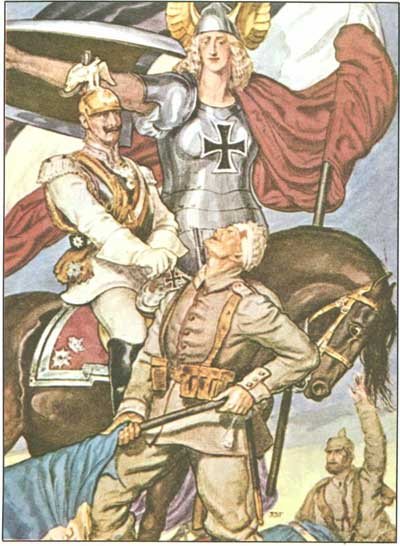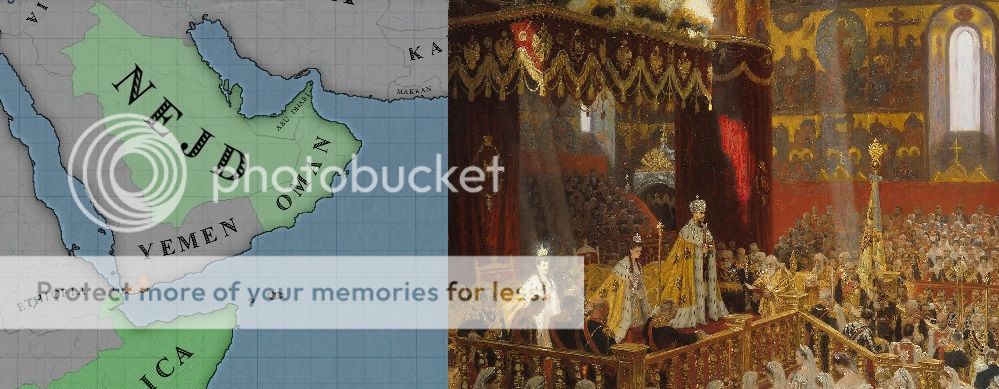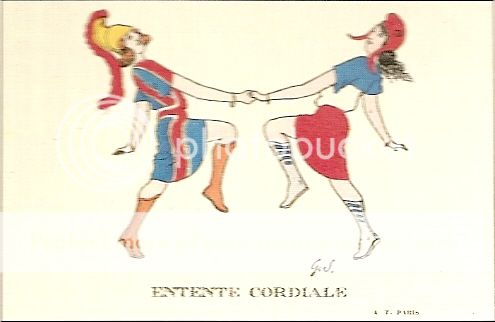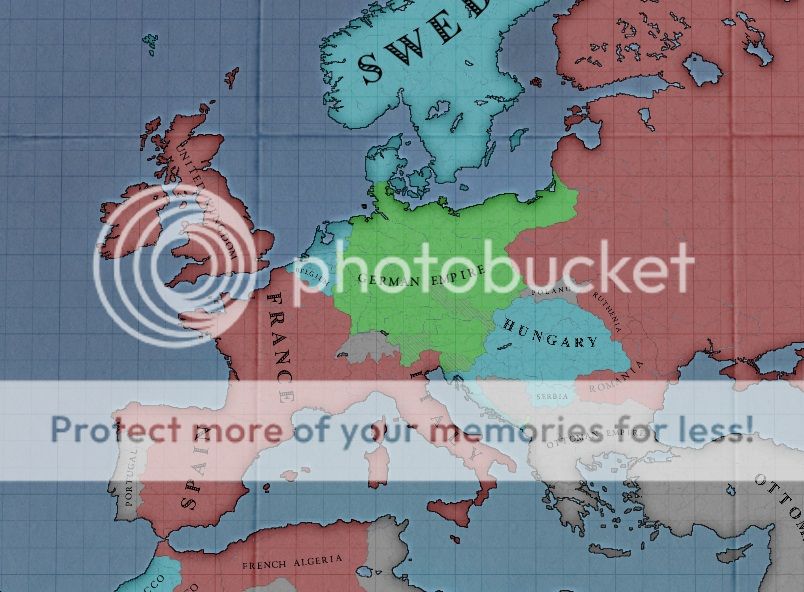Christian center party, and the Christian workers party. GENIUS.Hey, that's what popular opinion is going to be like in our new one-party state Germany. We could do with a Zentrum schism: Christian democracy and socialism are the only two tendencies not to have one yet.
Blood and Iron - An Interactive Prussian AAR
- Thread starter Tommy4ever
- Start date
-
We have updated our Community Code of Conduct. Please read through the new rules for the forum that are an integral part of Paradox Interactive’s User Agreement.
You are using an out of date browser. It may not display this or other websites correctly.
You should upgrade or use an alternative browser.
You should upgrade or use an alternative browser.
AAh, another strong showing by the DZP. The concessions weren't too bad. If you can be the largest party might as well be the party that plays king maker. And so the trend continues that the DZP wins its second election coming off of a loss from power, or every second election.
Yay! My top two picks in government together! Hopefully the DKRP and Zentrum foreign policies come to agreement on the importance of putting Russia in the German camp. Ending Austrian occupation is good, and market interventionism will hopefully bring back the growth rates of previous Konservative/Zentrum ministries. Not too big a fan of the tariff, but if it means a beefier German military then why not. All in all, excited for the next update.
I won't be able to post updates in the usual pattern this week due to deadlines and a short holiday at the start of next week. I plan in opening the next election on Friday so the gameplay update will come sometime before then.
I didn't realise I was making the conservatives come across as evil villains , will have to look into that. As for ideas of splits in Zentrum - a party with quasi-monarchist, Christian democratic, militantly catholic and even workerist factions certainly as the potential for divisions ... Up to now, however, the party has managed to hold these disparate groups together, that does not necessarily means it will always be able to do so.
, will have to look into that. As for ideas of splits in Zentrum - a party with quasi-monarchist, Christian democratic, militantly catholic and even workerist factions certainly as the potential for divisions ... Up to now, however, the party has managed to hold these disparate groups together, that does not necessarily means it will always be able to do so.
I didn't realise I was making the conservatives come across as evil villains
I won't be able to post updates in the usual pattern this week due to deadlines and a short holiday at the start of next week. I plan in opening the next election on Friday so the gameplay update will come sometime before then.
I didn't realise I was making the conservatives come across as evil villains, will have to look into that. As for ideas of splits in Zentrum - a party with quasi-monarchist, Christian democratic, militantly catholic and even workerist factions certainly as the potential for divisions ... Up to now, however, the party has managed to hold these disparate groups together, that does not necessarily means it will always be able to do so.
Sounds good, I would hope that the likelihood of the glue, tape and bubblegum that holds them together coming apart is increased if they suffer some big catastrophic defeat at the polls or something very divisive during their administration or both. Like it would for other parties. Seems as long as they succeed or perform respectable enough at the ballot box they can hold their various groups together. Or if otherwise, suffer a divorce of sorts like the LVD after their union just wasn't cutting it at the polls.
Last edited:
Into the Abyss
1893-1896
1893-1896
When Hertling rose to become Chancellor at the head of a new Zentrum led government there was a palpable hope of a better future across large parts of German society. Instead of ushering in a return to prosperity, Hertling would oversee one of the most turbulent periods in German history and the slow drive of the Empire into the abyss.
During the middle 1890s the world’s eyes became fixed upon the unlikely location of Transylvania – Siebenbürgen in German or Erdély in Hungarian. It was a region with a very confused ethnography – Romanians were the largest group with around 45% of the population and were mostly the poorest citizens with little urban presence, the second largest group were the Hungarians with around 30% of the population the region’s elite was almost exclusively drawn from this group, around 15% of the population were Transylvanian Saxons – the descendants of German speaking Medieval settlers whilst a further 5% were 19th century German settlers the rest of the population was a hodgepodge of Jews, Ruthenians, Poles, Serbs and Czech with the exception of the Jews these groups had mostly arrived in the 19th century. Although the ethnic makeup was confusing the diplomatic situation was rather simpler. The German backed Kingdom of Hungary ruled, the Russian supported Kingdom of Romania claimed the region. With Russia being regarded as the key to any anti-German alliance many Western European powers stridently supported the Romanian claim and aimed to spark tensions in the region with the clear goal of breaking the friendship between Berlin and St Petersburg for good.
Through 1893 tensions over Transylvania ran high as the execution of a significant number of Romanian dissidents became a cause celebre of the international press. As Romania rattled its sabre Italy, Spain and France all eagerly backed the Romanians – with both the Russian and British governments being lobbied by both sides. It was the unexpected death of the reforming German Emperor, Friedrich III, from illness in September 1893 that allowed for an end to the first Transylvanian Crisis. It was at the funeral of Friedrich III that that the Russian Tsar Alexander III met with the Crown Prince of Germany Wilhelm and the pair agreed to a settlement. In exchange for guarantees of the rights of the Romanian community in Hungary the Russians agreed to call their ally to restraint. With Russia calling for peace the crisis soon fizzled out and Europe was spared from the threat of conflict. Elsewhere, the reinforcing of the friendship between Germany and Russia led to Portugal accepting the status quo in Morocco – abandoning its efforts in the Sultanate.
Although he had played peacemaker internationally the new Kaiser – Wilhelm II – was seen by many as a threat to the political stability of Germany. Unlike his liberal leaning father and non-interventionist grandfather the new Emperor intended to challenge the authority of the elected government, desiring to reinforce the powers of the monarchy at the expense of the Reichstag. That said, the Kaiser’s moves were not immediate as he made no attempt to alter the government entering into an uneasy relationship with Chancellor Hertling.
As Germany entered 1894 few could have predicted the turbulence that would follow that year. A series of wildcat strikes by shipyard workers in Hamburg and Bremen broke out in late March with largely economistic demands. With non-union mandated strike action illegal in German the police were deployed to force the strikers back to work – resulting in violent conflagrations between the workers and the police. As news of the violence was widely disseminated across Germany strike action began to spread across the country. Not only did the SPD throw itself into action – it was supported (especially in the North) by elements of the Centre Party. With Centre Party cadres in both the trade unions, which they dominated, and the local party organisations openly involving themselves in this mass movement leading rebel Centrists joined with Socialists in publishing a list of demands which included both democratic reforms, pay increases across large sections of German industry and wide sweeping advancements in social legislation.
The German establishment was aghast. The Kaiser demanded that Chancellor Hertling bring his party to order and bring end the disturbances, which had spread across most of Northern and Central Germany by mid-April. Hertling was left in an impossible situation. The conservative wing of his party would not condone any negotiations with the strikers who had been labelled as Socialists and even revolutionists whilst the radical wing of his party had already openly embraced the movement. As Hertling dallied the situation grew ever more dangerous as the methods of the workers radicalised – factory occupations and machine breaking becoming common across large parts of the country as April wore on. With the proletarian suburbs of Berlin itself becoming effectively ungovernable the Chancellor finally acted decisively, complete party discipline was demanded of Centre cadres meaning the total abandonment of the movement whilst the government demanded an end to all strike action and the acceptance of a deal negotiated between the government, leading industrialists and the national trade union federation involving not insignificant concessions. As significant numbers of workers refused to accept the compromise the Chancellor called for the deployment of the army in bringing an end to the movement – hundreds dying in the resulting violence.
The events of the spring of 1894 resulted in the expulsion of 25 Reichstag deputies and large section of the membership from the Centre Party – with the Northern party all but ceasing to exist. These Centre rebels would go on to form the Free People’s Party (FVP), maintaining their radical calls for social and political reforms but without the SPD’s socialist perspective.
Internationally the respite gained from the agreements between Wilhelm II and the Alexander III of Russia did ease tensions for long. In the Middle East Germany, Britain, Russia and even the Italians through their Ottoman proxies found themselves in competition for influence. As German diplomacy in the region triumphed with Oman, the Trucial States and Najd all signing treaties with the German Empire Europe’s greatest power continued to isolate herself. Worse yet, Tsar Alexander III died in 1895 – the new Russian Emperor, Nicholas II, quickly fell under the influence of Franco-British factions at court.
Again the Transylvanian issue came to the fore in the months after Nicholas’ ascension. Angered by the continued Hungarian repression of the Romanian community in Transylvania, the Romanian government petitioned Russian support for a renewed effort to exert their claims on the region. With the Russians this time championing their lesser ally, the French, Italians and Spanish quickly lined up behind the Tsar. With war looking ever more likely German sought to ensure at the very least the neutrality of the British Empire. However, in the aftermath of the previous Transylvanian Crisis, the British had made secret agreements with the French and Russian government to intervene in any European conflict with Germany – regarding German domination of Central Europe and her overseas ambitions as a direct threat to the British Empire.
With virtually all of Europe lining up against Germany, diplomats dispatched by Berlin tried desperately to convince Russia and Britain to seek a peaceful solution to the Transylvanian Crisis. But it was to no avail. Following an assault on the Romanian embassy in Budapest as well as a series of violent pogroms against Romanians in Hungary the Kingdom of Romania declared war on Hungary. In response to this Germany declared war upon Romania, who were supported by Russia and her allies in Western Europe – Italy, France and Spain – as Germany’s allies in turned lined up behind her the British honoured their promise to intervene. By February 24th 1896 virtually every European state from the Atlantic Ocean to the Volga had entered the war on the side of either coalition. With the outbreak of the Great War all German diplomacy since the unification had failed.
Take Warsaw from Russian spher of influence, than take Venece from Italy, and whole Lorraine from France. Good luck anyway.
Good job DZP, you managed to turn a continent against us. Stellar work.
Oh sweet irony.
I still have that ticket to America, does anybody want to get off this sinking ship of state?
We just learned what Schadenfreude meant in my German class. Herr Miner believes that it's quite ironic that Germans have a word for it.I'm actually not taking this too badly, thought guess that's the Schadenfreude.

Gott ist mit uns.
Das Deutsche Reich wird allen, die es ablehnen zu besiegen.
Der Kreuzzug ist auf uns!
Für Kaiser und Christus!
God is with us.
The German Empire shall defeat all who oppose it.
The Crusade is upon us!
For Kaiser and Christ!
The German Empire shall defeat all who oppose it.
The Crusade is upon us!
For Kaiser and Christ!
What? What is that you say? Britain hates Germany because of some back-water colonies that has naught but given us a migraine? And now they are threatened by us because we hold said colonies? So far that they have made pre-war plans to acquire them? A far cry from the Germany post jacobins and pro-unionists. We have lost Great Britain, Italy and now Russia. Is there anything the liberals/catholics CAN do? Except making the entire continent hate us, of course.
What? What is that you say? Britain hates Germany because of some back-water colonies that has naught but given us a migraine? And now they are threatened by us because we hold said colonies? So far that they have made pre-war plans to acquire them? A far cry from the Germany post jacobins and pro-unionists. We have lost Great Britain, Italy and now Russia. Is there anything the liberals/catholics CAN do? Except making the entire continent hate us, of course.
Hey, you can't pin this one on us. We were in favour of good relations with Italy and Britain, and against some kind of Sabastiano-esque children's crusade to retake Constantinople.
What saddens me most is that this government has apparently achieved none of the goals of the Zentrum..
I fail to see the crucial flaw in Zentrum policy that could have caused this alienation, it seems to me to be the result of a variety of policies from a variety of parties, developing over the years.
The war is not what a good Christian would have wanted..
I fail to see the crucial flaw in Zentrum policy that could have caused this alienation, it seems to me to be the result of a variety of policies from a variety of parties, developing over the years.
The war is not what a good Christian would have wanted..







